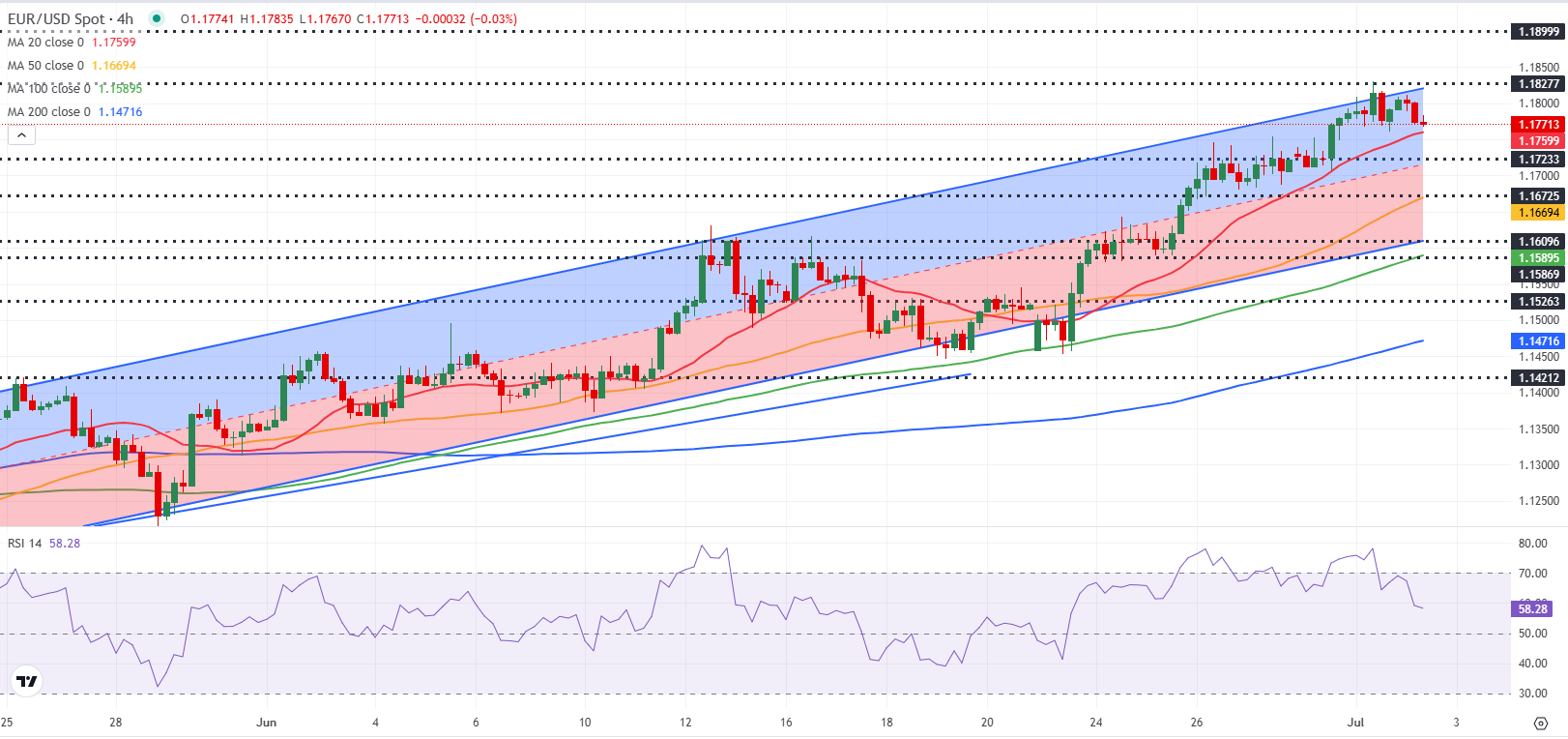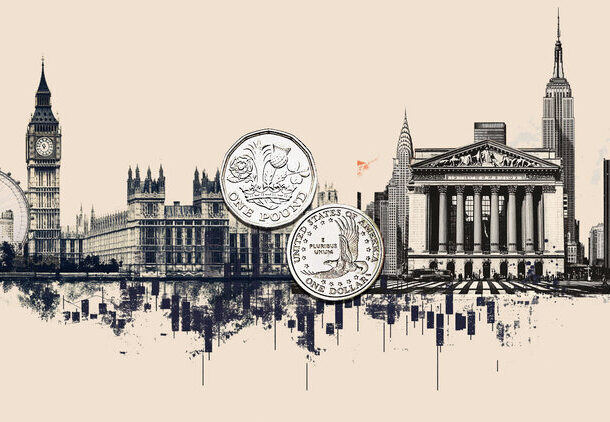- EUR/USD trades in negative territory below 1.1800 on Wednesday.
- The US economic calendar will feature private sector employment data for June.
- The technical outlook points to a loss of bullish momentum.
EUR/USD corrects lower on Wednesday and trades below 1.1800 after setting a new multi-year high at 1.1830 on Tuesday. The pair’s near-term technical outlook highlights a loss of bullish momentum as market focus shifts to private sector employment data from the US.
Euro PRICE Today
The table below shows the percentage change of Euro (EUR) against listed major currencies today. Euro was the weakest against the US Dollar.
| USD | EUR | GBP | JPY | CAD | AUD | NZD | CHF | |
|---|---|---|---|---|---|---|---|---|
| USD | 0.28% | 0.41% | 0.49% | 0.04% | 0.23% | 0.33% | 0.21% | |
| EUR | -0.28% | 0.10% | 0.19% | -0.27% | -0.03% | 0.17% | -0.06% | |
| GBP | -0.41% | -0.10% | 0.12% | -0.38% | -0.19% | 0.04% | -0.19% | |
| JPY | -0.49% | -0.19% | -0.12% | -0.44% | -0.27% | -0.12% | -0.28% | |
| CAD | -0.04% | 0.27% | 0.38% | 0.44% | 0.20% | 0.40% | 0.18% | |
| AUD | -0.23% | 0.03% | 0.19% | 0.27% | -0.20% | 0.26% | -0.01% | |
| NZD | -0.33% | -0.17% | -0.04% | 0.12% | -0.40% | -0.26% | -0.22% | |
| CHF | -0.21% | 0.06% | 0.19% | 0.28% | -0.18% | 0.00% | 0.22% |
The heat map shows percentage changes of major currencies against each other. The base currency is picked from the left column, while the quote currency is picked from the top row. For example, if you pick the Euro from the left column and move along the horizontal line to the US Dollar, the percentage change displayed in the box will represent EUR (base)/USD (quote).
The US Dollar (USD) stays resilient against its rivals early Wednesday and causes EUR/USD to stretch lower.
Cautious comments from Federal Reserve (Fed) Chairman Jerome Powell and news of United States (US) President Donald Trump’s “Big Beautiful Bill” passing the Senate seem to be supporting the USD. While speaking at a policy panel at the European Central Bank’s (ECB) Forum on Central Banking, Powell repeated that they expect to see higher inflation readings over the summer and added that they will wait and assess data before taking the next policy step.
Later in the session, Automatic Data Processing (ADP) is forecast to report an increase of 95,000 in private sector payrolls in June, following the disappointing 37,000 reported in May. A positive surprise, with a print above 100,000, could help the USD hold its ground and make it difficult for EUR/USD to regain its traction.
Investors will also pay close attention to political developments in the US. In case the “Big Beautiful Bill” clears the House of Representatives, easing fears over an economic downturn in the US could support the USD with the immediate reaction. On the other hand, the USD could come under renewed selling pressure if the bill fails to pass the House.
EUR/USD Technical Analysis

The Relative Strength Index (RSI) indicator on the 4-hour chart retreated below 60 and EUR/USD was last seen trading within a touching distance of the 20-period Simple Moving Average (SMA), after holding comfortably above this level for several days, reflecting a loss of bullish momentum.
On the downside, 1.1730 (mid-point of the ascending regression channel) aligns as the immediate support level before 1.1700 (static level, round level) and 1.1670 (50-period SMA). Looking north, resistance levels could be spotted at 1.1800 (round level, static level), 1.1830 (upper limit of the ascending channel) and 1.1900 (static level, round level).
Euro FAQs
The Euro is the currency for the 19 European Union countries that belong to the Eurozone. It is the second most heavily traded currency in the world behind the US Dollar. In 2022, it accounted for 31% of all foreign exchange transactions, with an average daily turnover of over $2.2 trillion a day. EUR/USD is the most heavily traded currency pair in the world, accounting for an estimated 30% off all transactions, followed by EUR/JPY (4%), EUR/GBP (3%) and EUR/AUD (2%).
The European Central Bank (ECB) in Frankfurt, Germany, is the reserve bank for the Eurozone. The ECB sets interest rates and manages monetary policy. The ECB’s primary mandate is to maintain price stability, which means either controlling inflation or stimulating growth. Its primary tool is the raising or lowering of interest rates. Relatively high interest rates – or the expectation of higher rates – will usually benefit the Euro and vice versa. The ECB Governing Council makes monetary policy decisions at meetings held eight times a year. Decisions are made by heads of the Eurozone national banks and six permanent members, including the President of the ECB, Christine Lagarde.
Eurozone inflation data, measured by the Harmonized Index of Consumer Prices (HICP), is an important econometric for the Euro. If inflation rises more than expected, especially if above the ECB’s 2% target, it obliges the ECB to raise interest rates to bring it back under control. Relatively high interest rates compared to its counterparts will usually benefit the Euro, as it makes the region more attractive as a place for global investors to park their money.
Data releases gauge the health of the economy and can impact on the Euro. Indicators such as GDP, Manufacturing and Services PMIs, employment, and consumer sentiment surveys can all influence the direction of the single currency. A strong economy is good for the Euro. Not only does it attract more foreign investment but it may encourage the ECB to put up interest rates, which will directly strengthen the Euro. Otherwise, if economic data is weak, the Euro is likely to fall. Economic data for the four largest economies in the euro area (Germany, France, Italy and Spain) are especially significant, as they account for 75% of the Eurozone’s economy.
Another significant data release for the Euro is the Trade Balance. This indicator measures the difference between what a country earns from its exports and what it spends on imports over a given period. If a country produces highly sought after exports then its currency will gain in value purely from the extra demand created from foreign buyers seeking to purchase these goods. Therefore, a positive net Trade Balance strengthens a currency and vice versa for a negative balance.
Information on these pages contains forward-looking statements that involve risks and uncertainties. Markets and instruments profiled on this page are for informational purposes only and should not in any way come across as a recommendation to buy or sell in these assets. You should do your own thorough research before making any investment decisions. FXStreet does not in any way guarantee that this information is free from mistakes, errors, or material misstatements. It also does not guarantee that this information is of a timely nature. Investing in Open Markets involves a great deal of risk, including the loss of all or a portion of your investment, as well as emotional distress. All risks, losses and costs associated with investing, including total loss of principal, are your responsibility. The views and opinions expressed in this article are those of the authors and do not necessarily reflect the official policy or position of FXStreet nor its advertisers. The author will not be held responsible for information that is found at the end of links posted on this page.
If not otherwise explicitly mentioned in the body of the article, at the time of writing, the author has no position in any stock mentioned in this article and no business relationship with any company mentioned. The author has not received compensation for writing this article, other than from FXStreet.
FXStreet and the author do not provide personalized recommendations. The author makes no representations as to the accuracy, completeness, or suitability of this information. FXStreet and the author will not be liable for any errors, omissions or any losses, injuries or damages arising from this information and its display or use. Errors and omissions excepted.
The author and FXStreet are not registered investment advisors and nothing in this article is intended to be investment advice.








